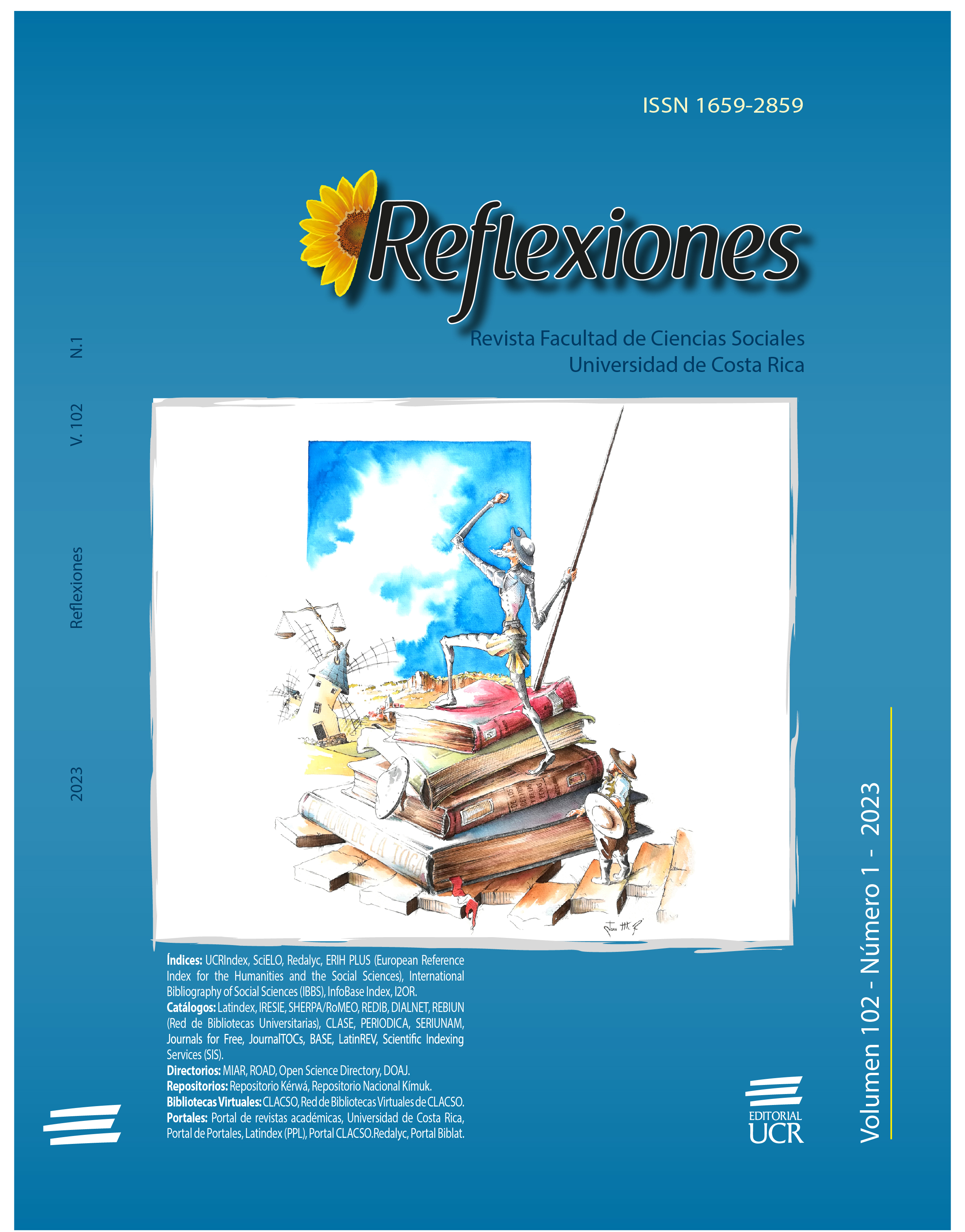Resumen
Introducción: Recientes investigaciones en el campo de las Ciencias Sociales han mostrado el aumento de las dinámicas del narcomenudeo en diversas zonas barriales de Gran Área Metropolitana. Este escenario permite la investigación de diversos elementos que se producen al interior de las dinámicas vinculadas a la venta y consumo de drogas, así como de la manera en que éstas impactan las comunidades en las que se sitúan.
Objetivo: Por ello el actual artículo pretende describir y explorar dos de los posibles elementos de la relación comunidad-narcomenudeo: la banalización y la costumbre de la violencia, en un espacio particular que ha sido afectado por los efectos del narcomenudeo desde hace tres décadas: Rincón Grande en el distrito de Pavas.
Método: La metodología empleada es de carácter narrativa comprendiendo un total de nueve entrevistas y cuatro recorridos presenciales a diversas partes del sector en estudio.
Resultados: Como resultados se encuentran diversas versiones de vecinos y vecinas de la zona que permiten reflexionar en torno a la tensión entre la costumbre y banalización de la violencia como efecto de la repetición de la violencia narcomenudeante, la constitución violenta de la comunidad mortificada y salidas alternativas a la resignación.
Conclusiones: Partiendo de estos resultados se arriba a la conclusión de que en la narrativa de las personas entrevistadas se presenta una fluctuación entre formas de banalización de la violencia y versiones que apelan a la alteridad de la situación.
Citas
Aguirre, Karla. 2012. Canto al padre: una aproximación al personaje del jefe narco a través de las corridas. En Gárate, I. Marinas, J. & Orozco, M (Eds), Estremecimeintos de lo real, Ensayos psicoanalíticos sobre cuerpo y violencia. Ciudad de México: Kanankil.
Alemán Lavigne, Jorge. 2017. Horizontes neoliberales de la subjetividad. Buenos Aires: Grama ediciones.
Arendt, Hanna. 2012. Eichman en Jerusalén: un estudio sobre la banalidad del mal. Madrid: Lumen.
Berardi Bifo, Franco. 2019. Futurabilidad. Buenos Aires: Caja Negra
Bourgois, Philippe. 2010. En busca de respeto: vendiendo Crack en Harlem. Argentina: Siglo Veintiuno.
López Bravo, Dayan. 2017. «De la naturalización de la violencia a la banalidad del mal». Revista Ratio Juris, 12 (24):111-126
Brown L, Wendy. 2016. El pueblo sin atributos: la secreta revolución del neoliberalismo. Madrid: Malpaso Ediciones.
Butler, Pamela Judith. 2017. El género en disputa. Buenos Aires Paidós.
Chacón Echeverría, Laura, y Zúñiga Rodríguez, Jimmy. 2014. «Más allá de las fronteras de la ciudad: La vida en el espacio de la exclusión». Revista de Ciencias Sociales, 4 (146), 127–139. Retrieved from https://www.redalyc.org/articulo.oa?id=15340989009%250ACo%25CC%2581mo
_______. 2015. «¿Será vida ver la muerte tan de cerca? Conflictos de drogas y lucha espacial en Pavas, Costa Rica». Anuario de Estudios Centroamericanos, 41, 279–302. https://doi.org/https://doi.org/10.15517/aeca.v41i1.21849
_______.2016. «Prácticas espaciales y tráfico de drogas en Pueblo Nuevo de Pavas: reterritorializar La Línea». Revista de Ciencias Sociales, II (152), 69– 88. https://doi.org/https://doi.org/10.15517/rcs.v2i152.27352
Colovini, Marité. 2014. La crueldad. En Orozco y Quirós (eds), Testimoniales de violencia Acercamientos psicoanalíticos a su discurso y drama subjetivo. Ciudad de México: Editorial Kanankil.
Derrida, Jacques. 2004. Políticas de la amistad. Madrid: Trotta.
Flores Artavia, Carlos, y González Ruíz, Samuel. 2008. Democracia y crimen organizado. In L. G. Solís & T. Foglesong (Eds.), Crimen organizado en América Latina y el Caribe (pp. 51–94). Santiago: FLACSO.
Foucault, Paul-Michel. 2007. Nacimiento de la biopolítica: curso del Collège de France (1978-1 979). Madrid: Akal.
Hernández Madrid, Miguel. 2014. «La banalidad del mal y el rostro contemporáneo de su ideología en una teleserie del narcotraficante Pablo Escobar en Colombia». Debates teóricos metodológicos, 8: 1-21.
Misse, Michel. 2010. «Crime, sujeito e sujeição Criminal: aspectos de uma contribuição analítica sobre a categoria». Lua Nova, São Paulo, 79: 15-38.
Organismo de Investigación Judicial. Memoria Estadística del Organismo de Investigación Judicial del 2013 al 2016. Recuperado de https://www.poder-judicial.go.cr/oij/index.php/apertura/transparencia/estadisticaspoliciales/memoriainstitucional-oij
Pavón-Cuellar, David, y Albarrán Díaz, Laura. 2012. Narcomensajes y cadáveres: el discurso del narcotráfico y su violentada literalidad corporal. En Gárate, I. Marinas, J. & Orozco, M (Eds), Estremecimeintos de lo real, Ensayos psicoanalíticos sobre cuerpo y violencia. Ciudad de México: Kanankil.
Reich, Wilhelm. 1980. Psicología de masas del fascismo. Barcelona: Bruguera.
Saborío Rodríguez, Sebastián. 2014. «Dalla normalizzazione al rifiuto: violenza come strumento di controllo territoriale nelle favelas pacificate». Sociología Del Diritto, 2, 171–196.
_______. 2016. «La territorializzazione dell’esclusione sociale e della violenza a Rio de Janeiro». Sicurezza e Scienze Sociali, 4 (1), 180–189.
_______. 2019. «Narcomenudeo y control territorial en América Latina». Revista Latinoamericana de Estudios de Seguridad 25, 71-86.
Saborío Rodríguez, Sebastián, y Astorga Leonardo. 2021. Esto se calienta en cualquier momento venta de droga y conflictos en Costa Rica. En prensa.
Umaña González, Carlos, y Chacón Echeverría, Laura. 2019. «Mataron a Tiqui: la banalización y fascinación de la muerte en escenarios narcomenudeantes». Anuario centro de investigación y estudios políticos, 9: 78-93.
Valencia Triana, Sayak. 2010. Capitalismo Gore. Ciudad de México: Melusina.
_______. 2014. «Del fascinante fascismo a la fascinante violencia: psico/bio/necro/política y mercado gore». Mitologías hoy: revista de pensamiento, crítica y estudios latinoamericanos 14, 75-91.
Weinstein, Marc. «Pensar el totalitarismo neoliberal seis tesis sobre totalitarismo». Illuso Théorie critique de la crise: École de Francfort, controverses et interprétations, 11, 141-179.
Žižek, Slavoj. 2006. Arriesgar lo imposible: Conversaciones con Glyn Daly. Madrid: Trotta.
_______. 2014. Acontecimiento. Madrid: Sexto piso.
##plugins.facebook.comentarios##

Esta obra está bajo una licencia internacional Creative Commons Atribución-NoComercial-CompartirIgual 4.0.
Derechos de autor 2021 Carlos Andrés Umaña González


